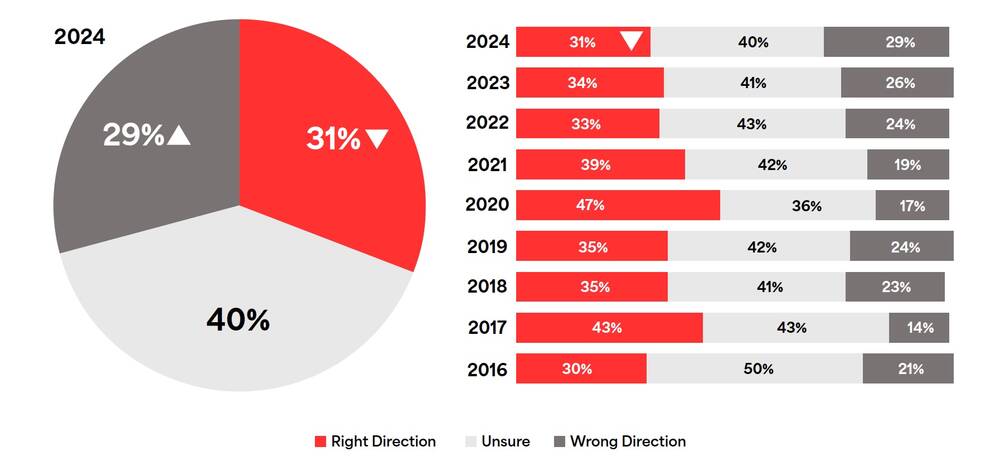Public trust in food system sees sharp decline

The Canadian public has become more divided and skeptical of Canada’s food system over the last year, according to the Canadian Centre for Food Integrity’s latest Public Trust Research Report.
Read Also
Canada’s first presumptive case of H5 avian influenza in an individual detected in B.C.
An individual in British Columbia has tested presumptive positive for avian influenza caused by the H5 influenza virus, the first detection of…
While it continues a trend observed in several prior years, report authors say the most recent results indicate that more concerted, joint public outreach efforts are needed from the agriculture sector.
Why it matters: Trust indicators for Canadian food and agriculture have been eroding in recent years. 2024 survey data indicates a steeper decline, indicating public outreach campaigns have not been effective.
According to the report, 31 per cent of Canadians believe the food system is on the right track, which is a drop of three percentage points from last year. Some 29 per cent feel the system is headed in the wrong direction, the first time in nearly a decade that the public is almost evenly divided on whether Canada’s food system is improving.
Concern about food prices continues to be a top issue for 51 per cent of respondents, a slight improvement from a year ago.
Positive perceptions of the food system are declining, with 45 per cent of Canadians holding a favourable view — a drop of seven percentage points from 2023. Negative impressions have risen from 11 to 18 per cent.
The survey used to generate the report data also included comparisons with other economic and service sectors — how much trust respondents have in agriculture compared to the health and education system, forestry or finance, for example. Agriculture and farmers continue to be the most trusted, but general declines across the board remain.
“COVID was a high-water mark,” says Ashley Bruner, director of research for the centre and one of the report authors. Though trust indicators have been trending downward in the last couple years, she considers the 2024 survey results “troubling.”
“What we’ve been doing hasn’t really moved the needle. In fact, we’re losing ground to those loud detractors … People don’t think we are honest,” says Bruner.
She clarified that “loud detractors” refers to those engaging in fear-based marketing or the promotion and dissemination of misinformation.
This, combined with a general increase in political dissatisfaction, is spurring greater indifference, if not outright cynicism, about Canada’s food system, an industry Bruner says has, until now, been “kind of a sacred cow” compared to other parts of the economy and public life.
Industry-wide strategy in development
Bruner stressed that public outreach and public relations campaigns are common across the agriculture and food sector and continue to have value. Because they tend to address sector-specific issues, however, they have not made a noticeable difference to Canadian agriculture as a whole.
“I wouldn’t be too hard on the industry. We’ve been putting out fires here and there in individual sectors,” Bruner says.
Now, she hopes the Canadian Centre for Food Integrity can step into a coordinating role, as part of a new industry-wide effort to address what appears to be accelerating declines in public trust.
A “concept of a plan” is now being developed in partnership with Farm Credit Canada other agriculture-industry partners, says Bruner — six in total, as of this writing. The plan will take the form of a cross-sector “public relations ground-game” designed to get food and agriculture in board rooms, on Bay Street and elsewhere, with metrics to measure impact.
The centre is seeking industry-matching funding to support this initiative. Details of the plan will be published on Canada’s Food Day this coming February.
“We’re looking to elevate food and agriculture back to a core Canadian societal value, and give people something to feel joyful about in a time when pessimism and negativity reign,” says Bruner. “It will be a big exercise in what (the Centre for Food Integrity) preaches.”
Source: Farmtario.com

